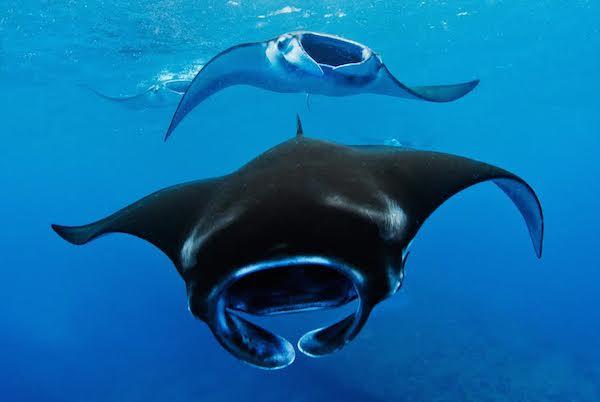Writing this from a hotel room in Indonesia’s second-largest city, Surabaya, I realize that I am filled with trepidation as I wait for the phone next to me to ring. When it does, the voice on the other end will tell me it’s go time; the culmination of many years of work towards ending the global trade in manta ray gills.
Worth up to $30 million a year, this industry depends on the traders for its survival. Chief among them is a secretive local man I’ve been calling Mr. Big. Working alongside the Wildlife Conservation Society (WCS), Conservation International (CI), and the Indonesian authorities, we plan to make today his last day in business.
Not much is known about Mr. Big, other than his standing in the industry, and that to take him out of the equation would be a major blow to it – not only internationally, but also in Indonesia, which passed laws in February 2014 protecting the manta species. Arresting him would mark the first time in this country’s history that anyone has been brought to justice in a case of marine conservation. It’s also proof of the determination of Indonesian authorities to stamp out the killing of one of the country’s most serene and majestic species; one that attracts $140 million dollars every year in global tourism.
The investigation has been arduous and lengthy. Even now, Mr. Big keeps changing our agreed location for the “sale” that’s about to take place. What was once a more open transaction of manta parts for money has now moved underground, thanks to the new legislation.
Although he appears furtive, Mr. Big was confident enough to tell us he currently has stock of 170 kilos of manta gills – the product of 24 animals – a number that is more alarming in the knowledge they produce a single pup just every three to five years. Our “buyer” has agreed to purchase 50 kilos for $144 per kilo, less than half its street value in China, home to the vast majority of manta gill consumers. Often believed to cleanse impurities from the system, there is actually nothing to suggest manta gills ever had a place in Chinese Traditional Medicine, nor scientific evidence that there are medical benefits to consuming them.
Once today’s deal is done, I will be reporting as the authorities descend, netting one of the biggest fish in the global manta gill trade. Though the penalty for his activities is still unclear, we can be certain Mr. Big’s absence from the scene will be a significant shock to all those who make their living from this destructive and wasteful enterprise.
8 p.m.
Finally, it’s go time. The team, comprising officers from The Ministry of Marine Affairs and Fisheries, the WCS, alongside plain clothed police officers and myself storm the warehouse, which is nestled among dried seafood stalls and nondescript from the outside, skillfully hiding the illegal activities taking place within its walls.
As we enter, the fisheries police present the ironically diminutive Mr. Big with a search warrant. He appears taken off guard and incredulous, looking on helplessly as authorities take only seconds to find the contraband in a back room. Fifty kilos of manta and mobula gills are strewn across the floor, 19.5 of which are from large oceanic manta rays. Aside from the sad and pointless loss of marine life, the impact for Indonesia is also economic, with each member of the species generating $1 million in tourism over its natural life.
The new law protects only two species of manta ray: the oceanic (Manta birostris) and the reef manta ( Manta alfredi), both listed on the 2013 Convention on International Trade in Endangered Species (CITES), which helped Indonesia, as a signatory, execute the legislation. However, at this stage, it excludes the mobula ray (genus Myliobatidae), a close cousin.
With the raid in full swing, fisheries police quickly get to work, separating the gills of the various species. In the process, they also uncover 13 kilos of dried turtle meat, another protected species. The surprise seizure possibly originates from the critically endangered hawksbill turtle, which inhabits the inshore reefs of Indonesia.
With the haul mounting, Mr. Big (who we’ve discovered is a local seafood restaurant owner named Suep, and one of Surabaya’s four leading manta traders) faces a maximum fine of $25,000 for the sale and possession of manta ray gills. There’s also a likely $10,000 fine for trading in turtle meat, as well as a possible prison sentence of five years.
A single kilo of large manta ray gills holds a street value in Surabaya of up to $175 per kilo, while a kilo of sea turtle meat can fetch around $40.
Under police questioning, Mr. Big claims he’s a sea cucumber trader, only receiving manta gills when requested, and pleading ignorance about the status of manta as a protected species in Indonesia. Interesting, since before the bust, he was only too happy to inform undercover agents that not only does he specialize in manta gills and turtle meat, he was abundantly aware that his activities were illegal.
Though our operation ultimately succeeded in its aim of capturing Mr. Big, the team couldn’t locate the other 120 kilos of stock he admitted to possessing. He did, however, reveal that the gills were coming from traders in Bali and East Java – yet more evidence of the continuing threat posed to oceanic species, and that our work to safeguard them must continue.
Mr. Big will appear in court in mid-October 2014, in Surabaya, Indonesia.
Read more at http://news.mongabay.com/2014/1001-hilton-manta-bust.html#xfX4CK7dK2KKyDmj.99
